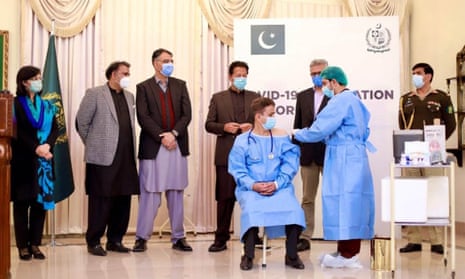While western Europe’s “vaccine war” has been a struggle to prevent doses from being exported, in another part of the world, the battle is to give vaccines away.
Last week, a Bahraini prince and his retinue arrived in Nepal to climb Mount Everest. They brought climbing gear, provisions and – in an apparent surprise to regulators in Kathmandu – enough Covid-19 vaccines to inoculate 1,000 people.
Bahrain intended the vaccines as a “friendly gesture” to the residents of a village that had recently renamed some hills in honour of the Gulf state’s royals. It coordinated the trip with Nepal’s embassy in Manama, but health ministry officials in the Himalayan country had other ideas, confiscating the Sinopharm doses at the airport.
“It wasn’t coordinated properly,” a spokesperson for the ministry told the Observer. “In general, unauthorised vaccines aren’t allowed in the country.”
The aborted gift was the most unusual of what has been a spree of vaccine giveaways across south Asia.
Over the past decade, China has ramped up its relationship with Sri Lanka, the Maldives, Bangladesh and other states traditionally considered to be in India’s sphere of influence.
The rivalry between Delhi and Beijing has occasionally taken the form of high-altitude standoffs between their armies, but over past months, it has involved a scramble to send Covid-19 vaccine doses across the wider world.

India, with its formidable vaccine manufacturing capacity, and a licensing deal to produce AstraZeneca’s formulation, has donated nearly 60m doses; the crates arrive in foreign capitals bearing the message: “Gift from the people and government of India”.
“When western countries started vaccination, people in our countries were also concerned they should be getting vaccines,” Palitha Abeykoon, president of the Sri Lankan Medical Association, told the Observer last month, as the first Indian-made doses were arriving in Colombo. About 500,000 were delivered in the first batch. He said: “That’s going to be enough for all our frontline workers.”
China says it plans to send its own manufacturers’ vaccines as aid to 69 countries, and is selling them to another 28 as part of agreements that could provide a commercial foothold for its pharmaceutical industries in regions normally dominated by US drug makers, including the Middle East and Latin America.
Analysts in Delhi say India’s donations are both strategically savvy and realistic. Like most countries, India has never embarked on a vaccination drive as large as that against Covid-19. It needed weeks to scale up the vaccine infrastructure, usually geared at children and pregnant women, so that it would serve a population of more than 1.3 billion.
In the meantime, manufacturers, including the Serum Institute of India, were pumping out about 2.5m doses of Covid vaccines every day, giving Delhi some room for largesse.
With China firmly in their sights, an emerging partnership of Japan, Australia, the US and India – who label their grouping the Quad – last weekend announced a plan to expand India’s manufacturing capacity even further, with a view to distributing vaccines in south-east Asia, another site of geopolitical contest.
The Indian programme of “vaccine maitri” (vaccine friendship) has been cheered all the way by local media, but as both India and China seek to begin inoculating greater swathes of their own populations, pressure to keep more supply at home may grow. On Thursday, the UK confirmed that its vaccination programme foresaw a major shortage over the coming weeks due to the later than expected arrival of doses from the Serum Institute.
A source authorised to speak for the manufacturer, based in Pune, in western India, told the Observer that 5m doses bound for Britain were being held back by greater Indian demand for jabs, as a second wave of the virus forms in its cities.
China, too, has set itself a target of vaccinating 40% of its population, a vast number that will require increasing its rate of administering jabs by more than six times, according to current publicly available figures – a scaling up that may require delaying some of its commitments to send vaccines overseas.
Both the Asian giants have talked up the benefits of their vaccine diplomacy, but as the pandemic drags on, the risks may come into sharper view.
“I don’t spite our Covid-19 vaccine diplomacy, but where is my vaccine?” Indian researcher Happymon Jacob wrote on Twitter last week. “Why can’t the world’s pharmacy provide vaccines to its own citizens?”
Additional reporting by Rajneesh Bhandari in Kathmandu
